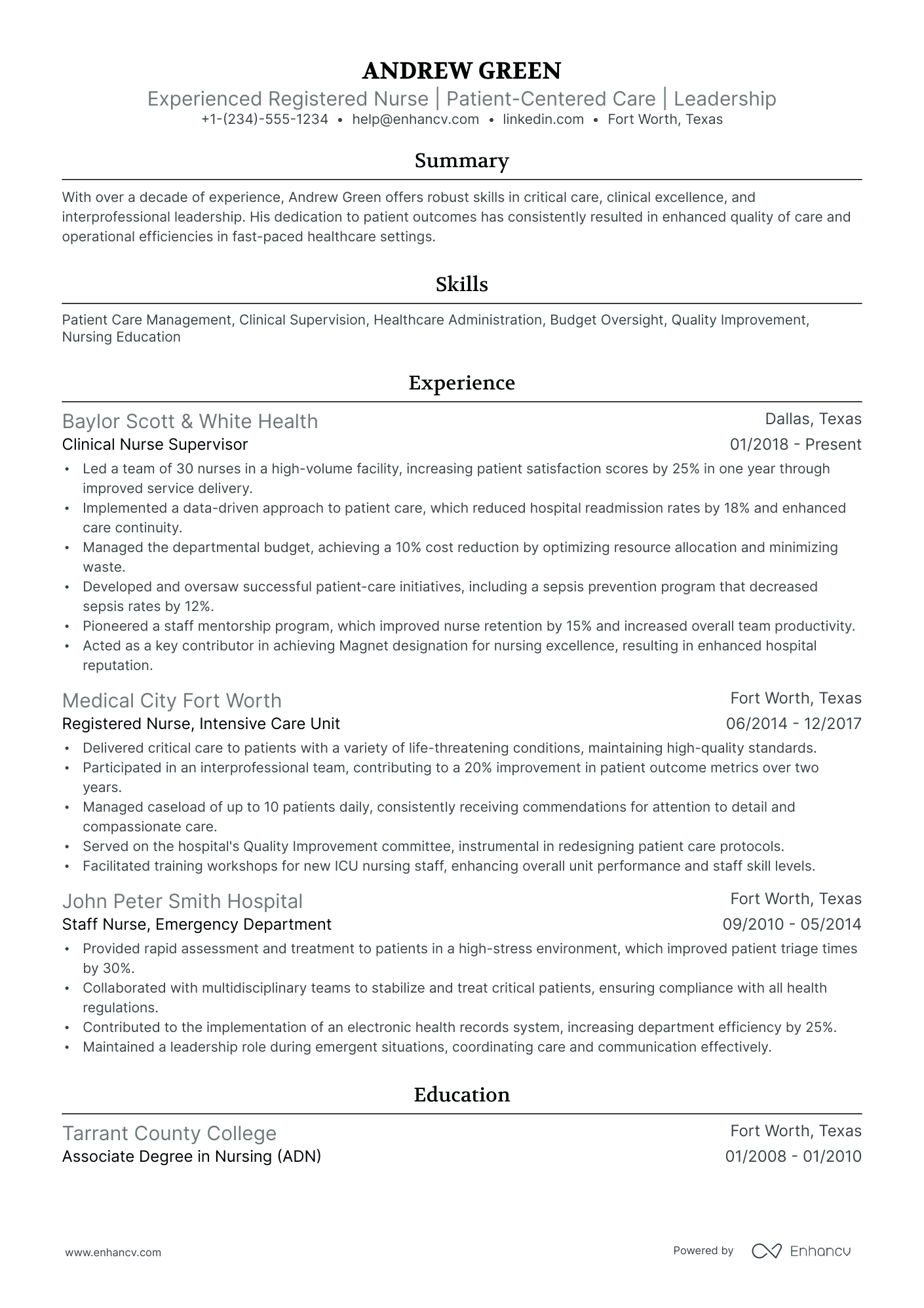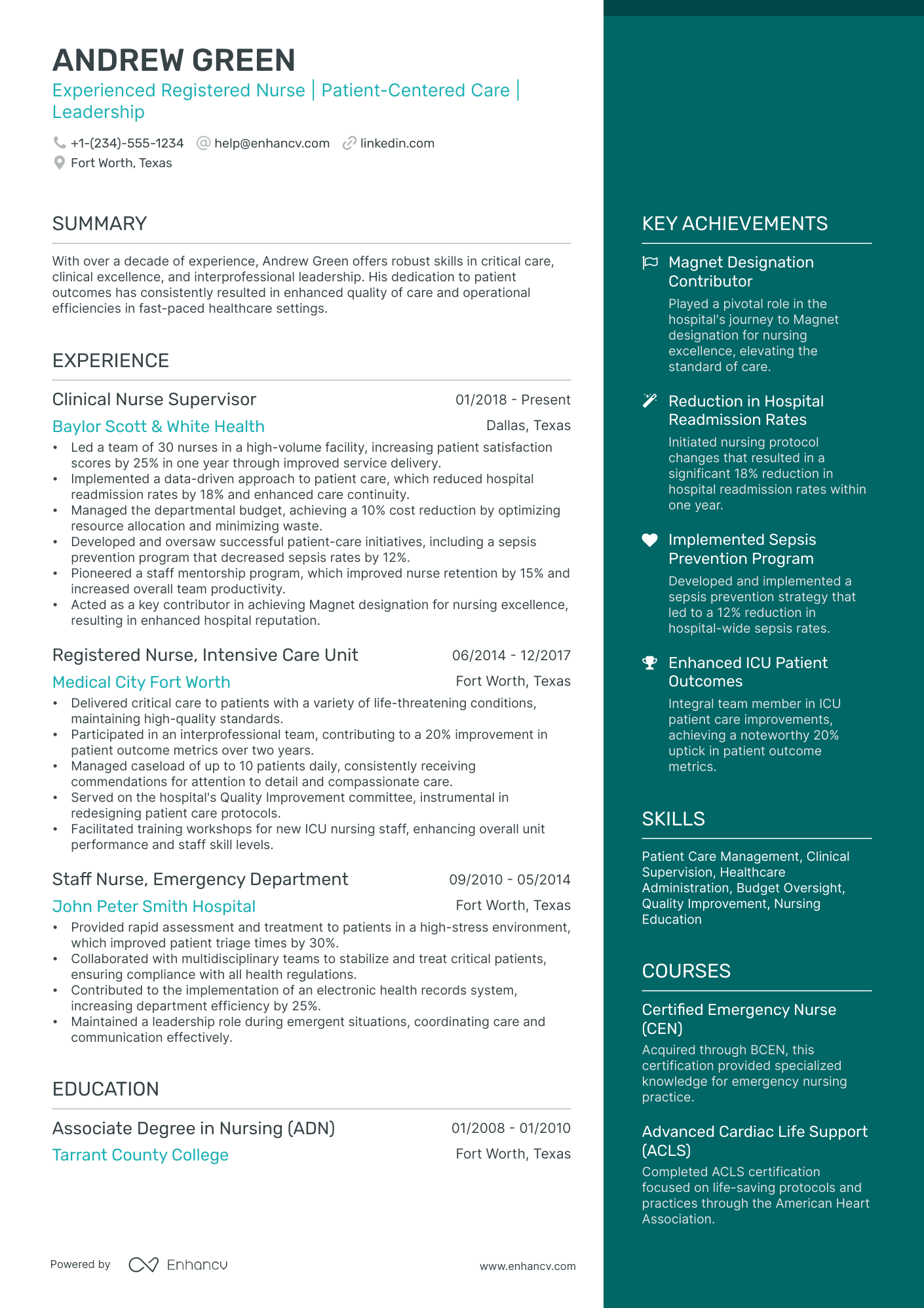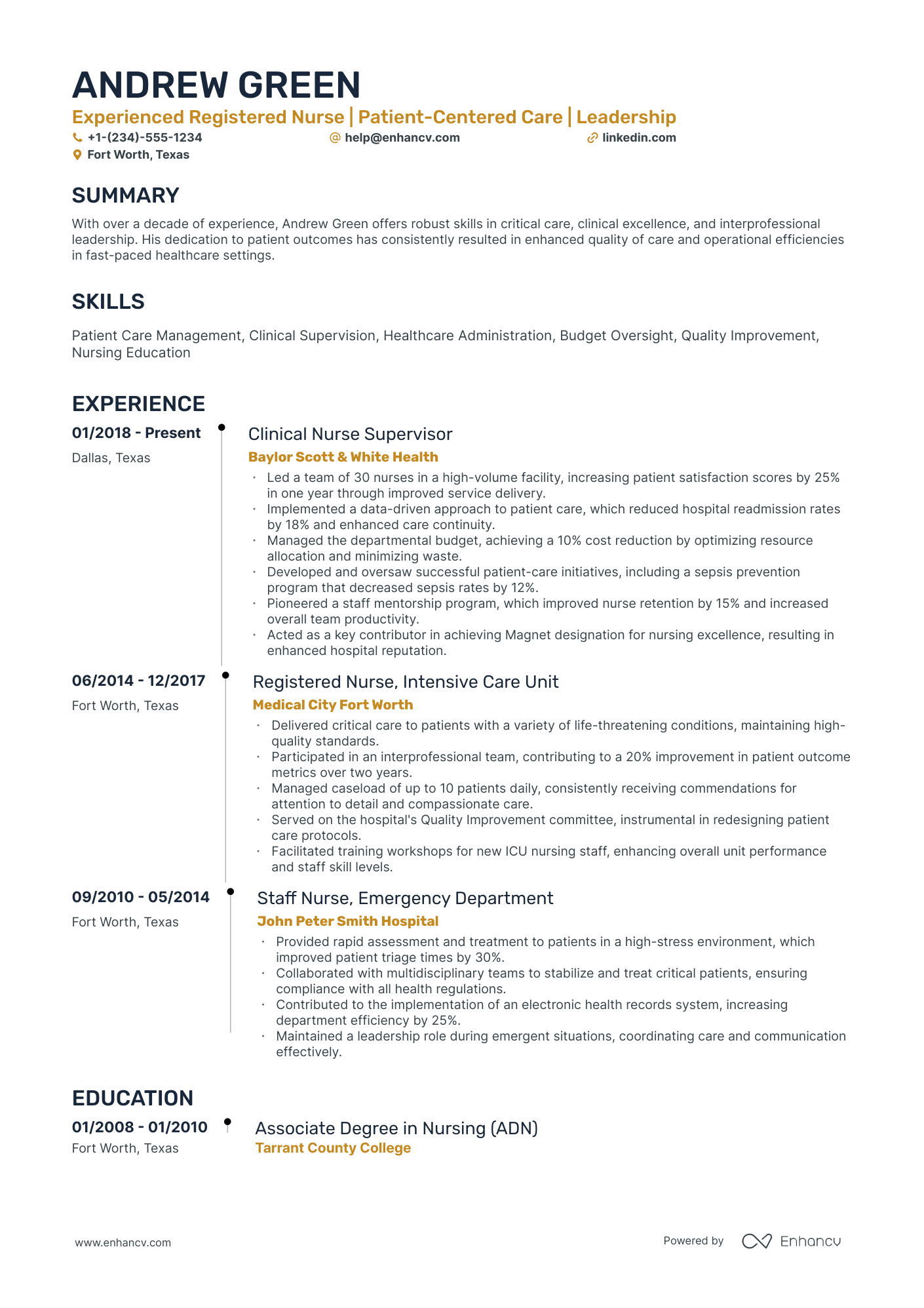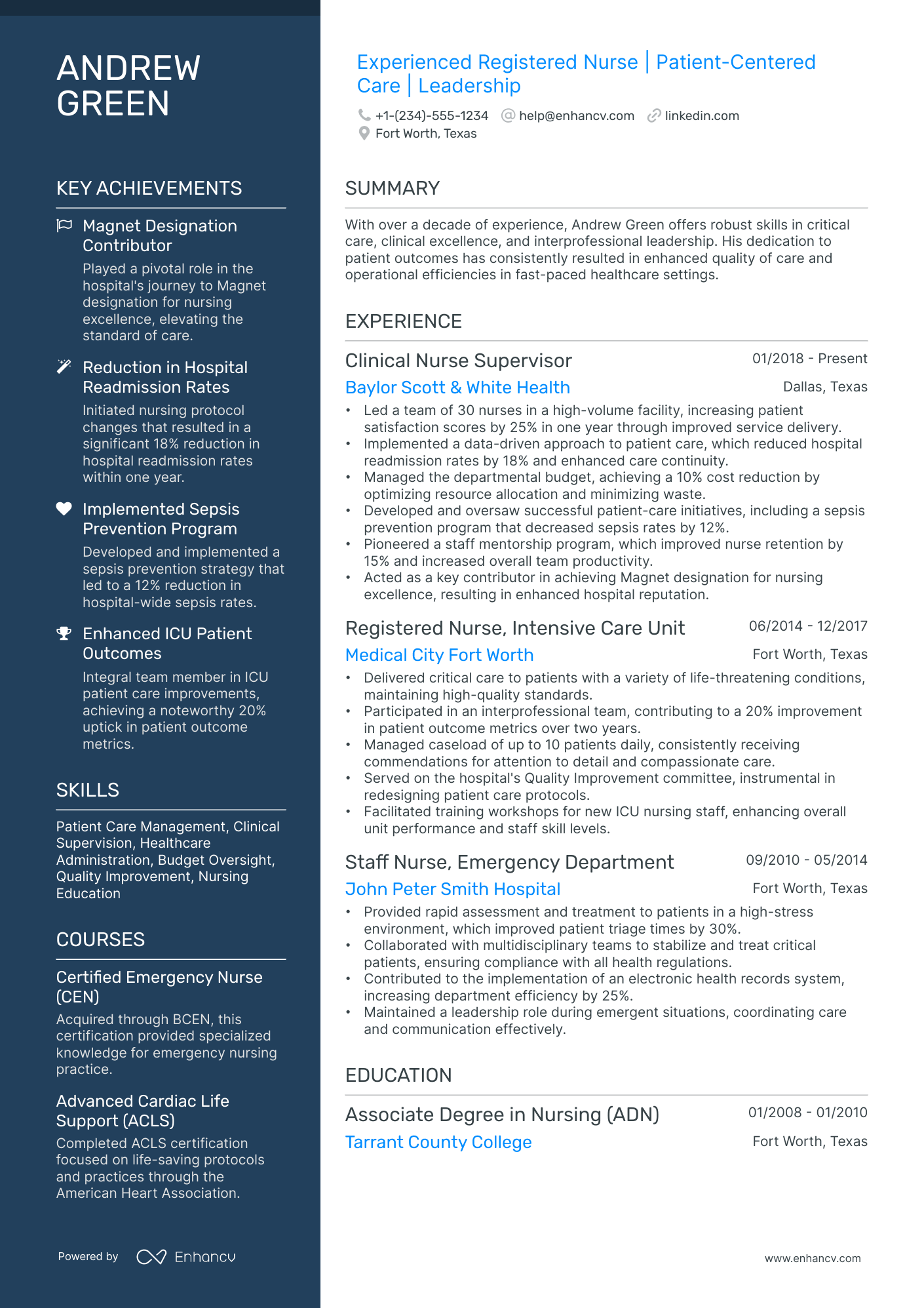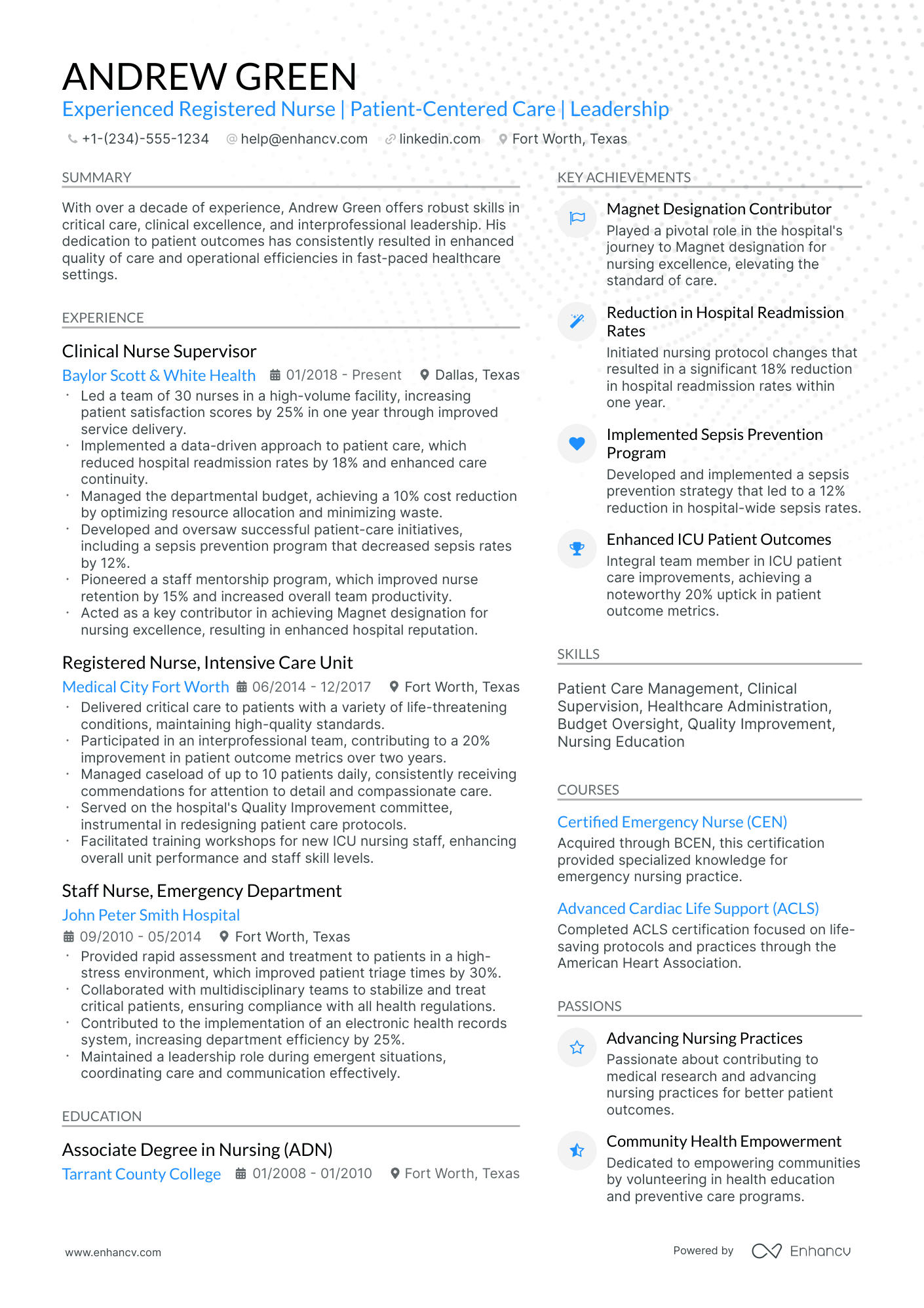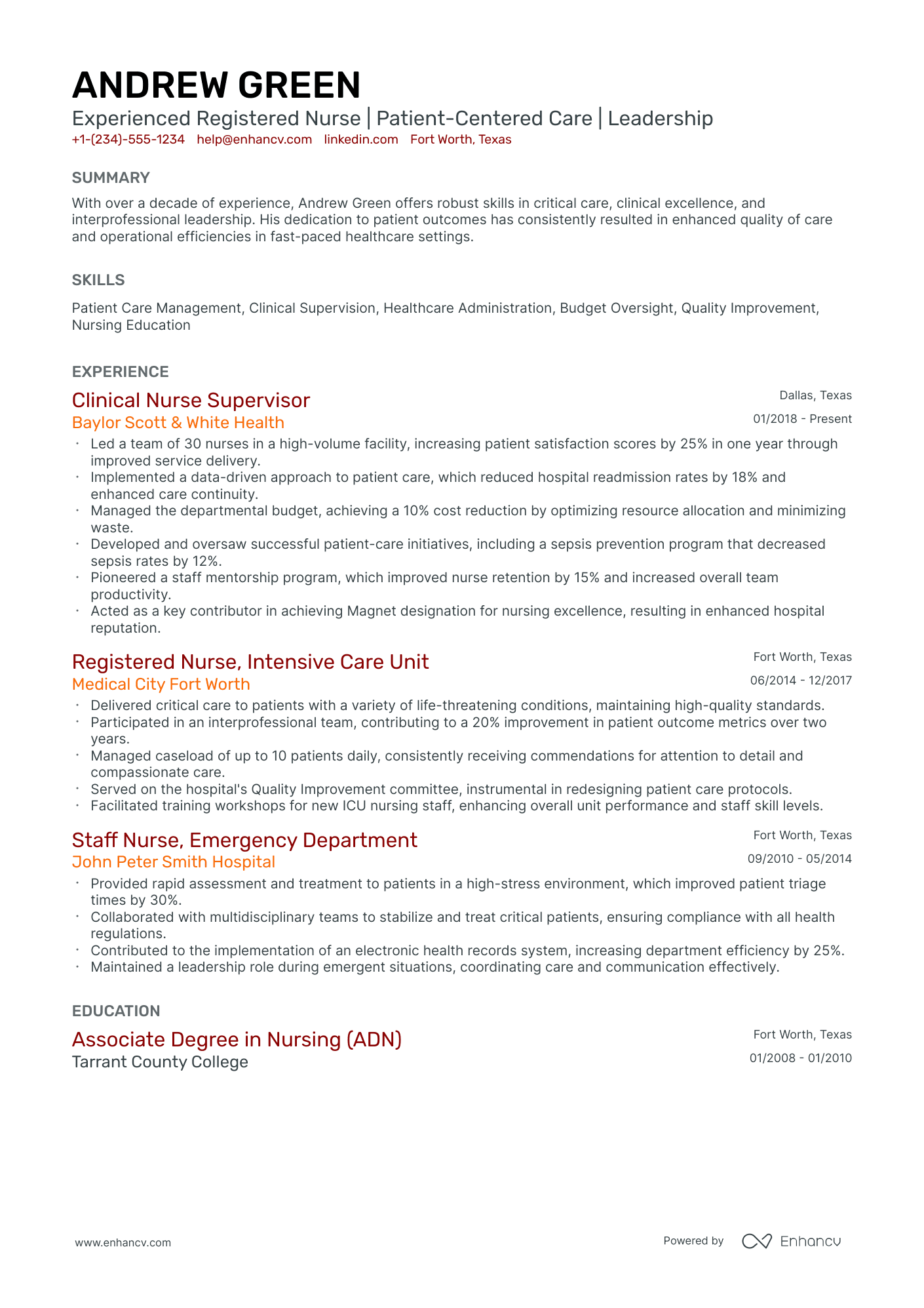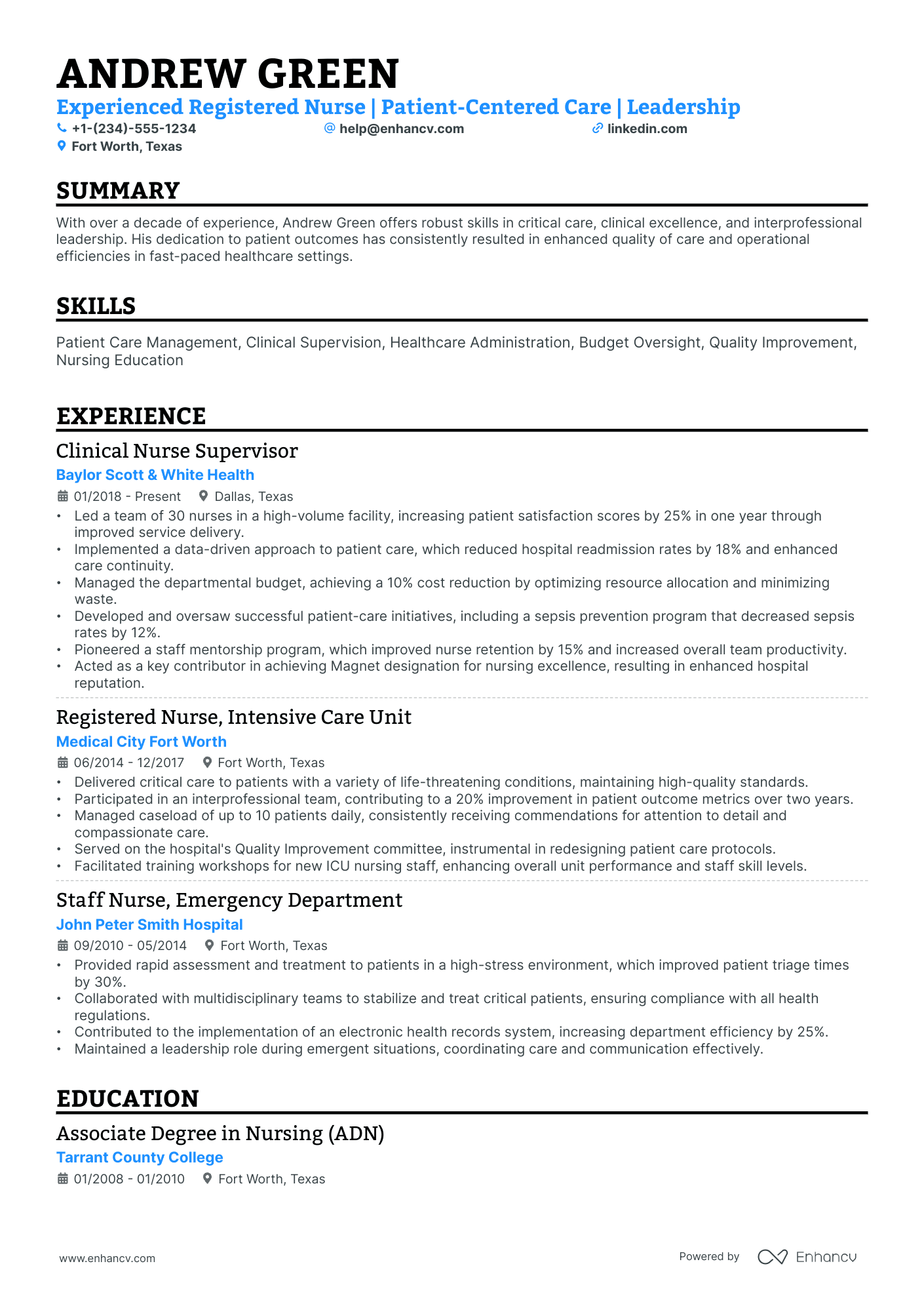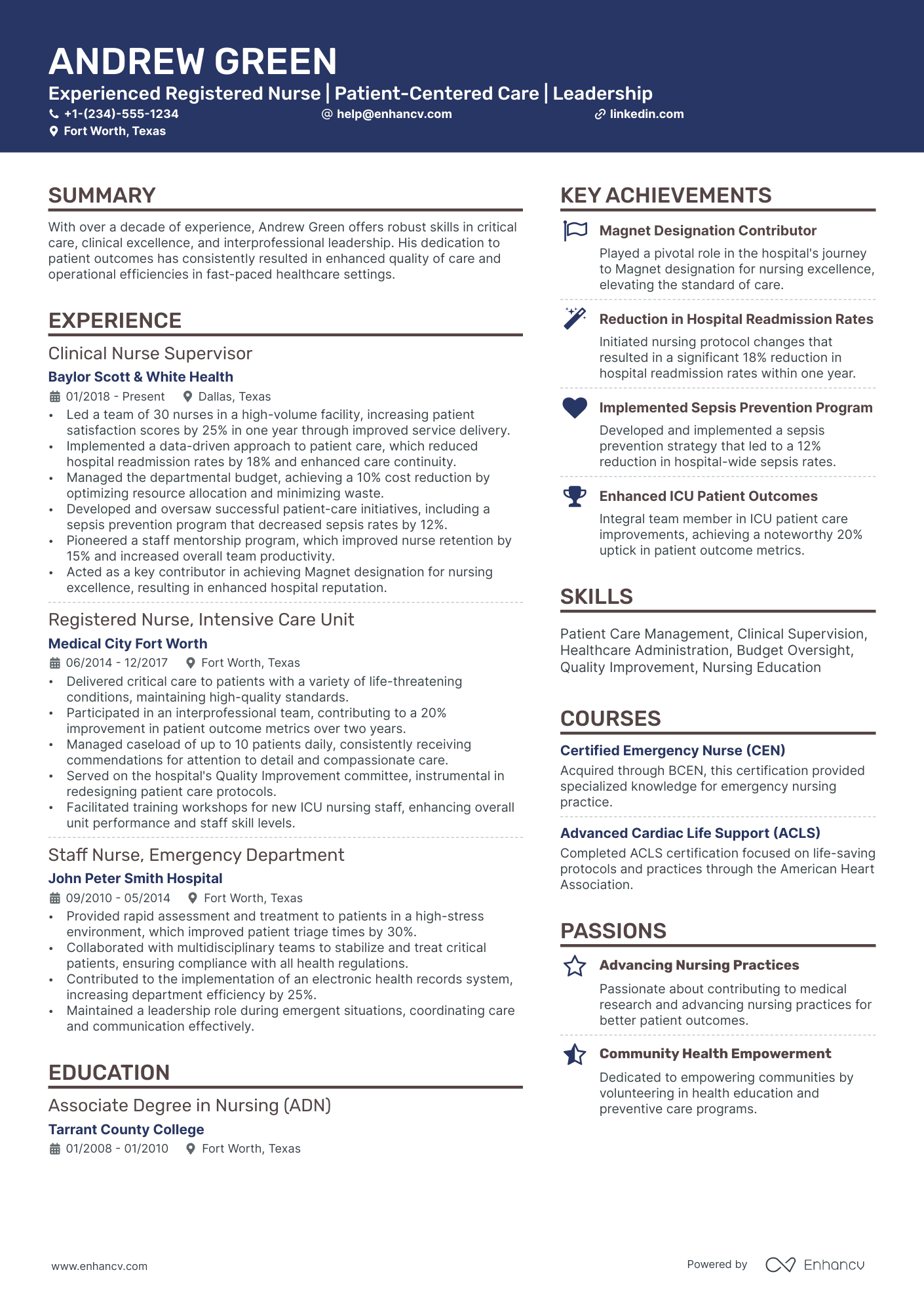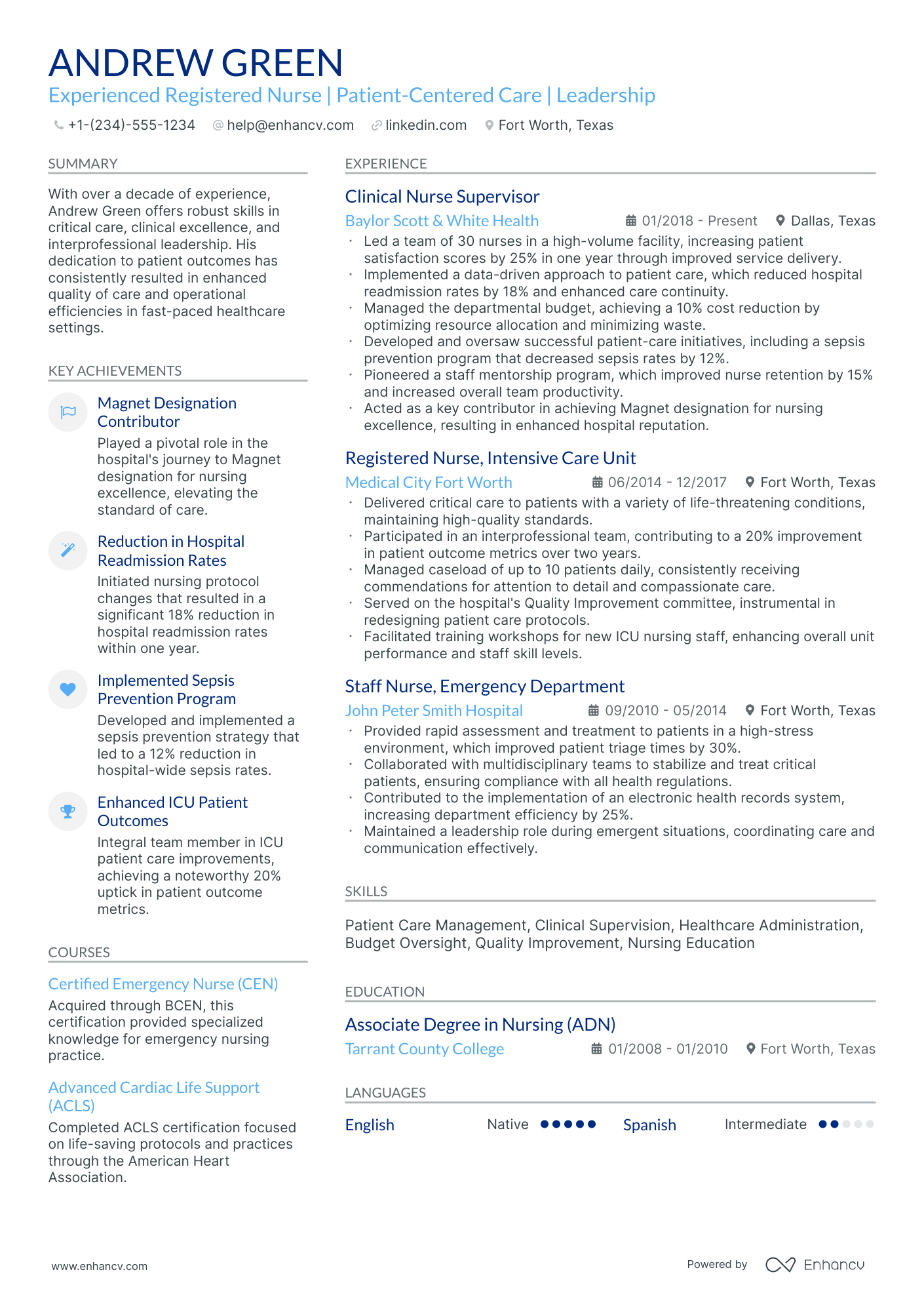Most OB nurse resume submissions fail because they read like shift summaries, not evidence of clinical impact. That hurts when an ATS (applicant tracking system) filters fast and recruiters scan in seconds amid heavy competition.
A strong resume shows how you improved outcomes, not just what you did. Understanding how to make your resume stand out is essential in this competitive field. Highlight reduced postpartum hemorrhage rates, high fetal monitoring compliance, faster triage-to-delivery times, lower cesarean rates, stronger patient satisfaction, safe management of high-risk volumes, and fewer documentation errors.
Key takeaways
- Quantify clinical outcomes like hemorrhage rates, triage times, and delivery volumes in every experience bullet.
- Use reverse-chronological format with direct OB experience; use hybrid format when transitioning into the role.
- Tailor each resume to the job posting's specific protocols, EHR platforms, and certifications.
- Demonstrate skills through measurable achievements in your summary and experience, not just a skills list.
- Entry-level candidates should lead with clinical rotations, simulation hours, and documentation accuracy metrics.
- Prioritize certifications like RNC-OB, NRP, and C-EFM directly after your education section.
- Use Enhancv's tools to turn vague duties into focused, recruiter-ready bullets aligned with each role.
How to format a OB nurse resume
Recruiters reviewing OB nurse resumes prioritize clinical competencies in labor and delivery, fetal monitoring, and maternal-newborn care, along with relevant certifications such as RNC-OB or NRP. A clean, well-structured format ensures these qualifications surface quickly during both human review and applicant tracking system (ATS) scans. Choosing the right resume format is the first step toward making your application competitive.
I have significant experience in this role—which format should I use?
Use a reverse-chronological format to highlight your depth of clinical experience and professional growth in obstetric nursing. Do:
- Lead with your most recent OB nursing position and clearly define your scope: unit size, patient volume, acuity level, and any charge nurse or preceptor responsibilities.
- Feature role-specific skills and tools early—electronic fetal monitoring, EHR platforms like Epic or Cerner, triage protocols, and certifications such as RNC-OB, C-EFM, or NRP.
- Quantify outcomes and contributions that demonstrate your direct impact on patient safety and unit performance.
I'm junior or switching into this role—what format works best?
A hybrid format works best because it lets you lead with relevant OB nursing skills while still providing a chronological work history that shows momentum. Do:
- Place a focused skills section near the top that highlights maternal-newborn competencies, fetal monitoring training, and certifications—even if recently earned.
- Include clinical rotations, capstone projects, internships, or related nursing roles (med-surg, NICU, postpartum) as transitional experience that demonstrates your readiness for OB care.
- Connect every action to a result so recruiters can see your clinical reasoning in practice, not just a list of duties.
Why not use a functional resume?
A functional format strips away the timeline and context recruiters need to verify where and when you applied your OB nursing skills, which makes it harder to assess your readiness for patient care responsibilities.
- A functional format may be acceptable if you're a nurse transitioning from a non-OB specialty or returning after an extended career gap—but only if you tie every listed skill to a specific clinical project, rotation, or patient care outcome rather than presenting skills in isolation.
Once you've established a clean, readable format, the next step is deciding which sections to include and how to arrange them for maximum impact.
What sections should go on a OB nurse resume
Recruiters expect a clear, complete resume that shows your labor and delivery expertise, patient outcomes, and unit-level scope. Knowing which resume sections to include ensures nothing critical gets overlooked.
Use this structure for maximum clarity:
- Header
- Summary
- Experience
- Skills
- Projects
- Education
- Certifications
- Optional sections: Awards, Leadership, Volunteering
Strong experience bullets should emphasize measurable outcomes, patient safety, acuity and volume handled, interdisciplinary coordination, and improvements you drove in maternal and neonatal care.
Is your resume good enough?
Drop your resume here or choose a file. PDF & DOCX only. Max 2MB file size.
Once you’ve organized your resume with the right structure and supporting details, you can focus on writing your OB nurse experience section so it aligns with that framework and shows your impact.
How to write your OB nurse resume experience
Your experience section should spotlight the clinical outcomes you've delivered, the obstetric tools and methods you've applied, and the measurable impact you've made on maternal and neonatal care. Hiring managers prioritize demonstrated results—improved patient outcomes, reduced complications, and efficient care delivery—over descriptive task lists. Building a targeted resume ensures every bullet speaks directly to the role's clinical priorities.
Each entry should include:
- Job title
- Company and location (or remote)
- Dates of employment (month and year)
Three to five concise bullet points showing what you owned, how you executed, and what outcomes you delivered:
- Ownership scope: the patient populations, labor and delivery units, triage workflows, or postpartum care programs you were directly accountable for as an OB nurse.
- Execution approach: the clinical tools, fetal monitoring systems, electronic health record platforms, evidence-based protocols, or assessment frameworks you used to guide obstetric decision-making and deliver patient care.
- Value improved: changes to maternal or neonatal outcomes, patient safety metrics, complication rates, care quality, or unit efficiency that resulted from your nursing interventions.
- Collaboration context: how you partnered with obstetricians, midwives, neonatologists, anesthesiologists, lactation consultants, or interdisciplinary care teams to coordinate seamless patient care throughout the perinatal continuum.
- Impact delivered: outcomes expressed through improvements in patient recovery, birth outcomes, unit performance, patient satisfaction, or risk reduction rather than a summary of daily responsibilities.
Experience bullet formula
A OB nurse experience example
✅ Right example - modern, quantified, specific.
Labor and Delivery Registered Nurse (OB)
Riverside Women’s Hospital | Austin, TX
2021–Present
High-volume labor and delivery unit supporting low- to high-risk pregnancies, including a Level III neonatal intensive care unit.
- Triage and manage an average of twelve patients per shift using the Obstetric Triage Acuity Scale (OTAS), SBAR handoffs, and Epic (electronic health record), cutting door-to-fetal-monitor time by twenty percent.
- Initiate, interpret, and document continuous electronic fetal monitoring (EFM) in Epic and central monitoring systems; escalated Category II and III tracings with obstetricians and anesthesia, reducing emergent cesarean sections by eight percent.
- Administer and titrate oxytocin, magnesium sulfate, and epidural infusions using smart pumps and standardized protocols; decreased medication-variance events by thirty percent through barcode medication administration compliance.
- Coordinate interdisciplinary huddles with obstetricians, neonatology, anesthesia, and respiratory therapy for high-risk deliveries; improved postpartum hemorrhage response time by three minutes and lowered massive transfusion activations by fifteen percent.
- Lead postpartum hemorrhage and shoulder dystocia simulations using AWHONN-aligned checklists and debriefs; raised team drill pass rates from eighty-two percent to ninety-six percent and improved documentation completeness by twenty-five percent.
Now that you've seen how a strong OB nurse experience section comes together, let's break down how to tailor each element to match the specific job you're applying for.
How to tailor your OB nurse resume experience
Recruiters evaluate your OB nurse resume through both applicant tracking systems and hands-on review. Tailoring your resume to the job description ensures your qualifications connect directly with what each employer needs.
Ways to tailor your OB nurse experience:
- Match fetal monitoring systems and equipment named in the posting.
- Mirror the exact terminology used for labor and delivery protocols.
- Reflect patient acuity levels or nurse-to-patient ratios referenced.
- Include certifications like NRP or AWHONN the employer specifies.
- Highlight high-risk antepartum or postpartum experience when requested.
- Emphasize electronic health record platforms the facility uses.
- Align your triage and assessment language with stated clinical standards.
- Reference interdisciplinary collaboration models described in the listing.
Tailoring means aligning your genuine accomplishments with the role's stated requirements, not forcing unrelated keywords into your experience bullets.
Resume tailoring examples for OB nurse
| Job description excerpt | Untailored | Tailored |
|---|---|---|
| Provide comprehensive nursing care during labor, delivery, and postpartum recovery using electronic fetal monitoring (EFM) and document in Epic EMR | Provided patient care during labor and delivery in a hospital setting | Delivered comprehensive nursing care throughout labor, delivery, and postpartum recovery for 8–12 patients weekly, interpreting electronic fetal monitoring (EFM) strips and documenting assessments, interventions, and outcomes in Epic EMR |
| Assist with high-risk antepartum patients, administer magnesium sulfate and Pitocin per protocol, and collaborate with maternal-fetal medicine specialists | Administered medications and worked with doctors to help patients | Managed high-risk antepartum patients by administering magnesium sulfate drips and Pitocin titration per hospital protocol, collaborating directly with maternal-fetal medicine specialists to adjust care plans and reduce preterm delivery complications |
| Perform newborn assessments including APGAR scoring, initiate breastfeeding support, and educate families on postpartum care and safe sleep practices | Helped new mothers with their babies and provided education after delivery | Conducted newborn assessments including APGAR scoring at 1 and 5 minutes, initiated skin-to-skin contact and breastfeeding support within the first hour of delivery, and educated 500+ families annually on postpartum recovery, safe sleep guidelines, and feeding techniques |
Once you’ve aligned your experience with the role’s priorities, the next step is to quantify your achievements so hiring managers can quickly see your impact.
How to quantify your OB nurse achievements
Quantifying your achievements proves clinical impact, safety, and efficiency. Focus on delivery volume, hemorrhage and infection outcomes, medication accuracy, triage-to-intervention time, patient satisfaction scores, and compliance audit results.
Quantifying examples for OB nurse
| Metric | Example |
|---|---|
| Patient volume | "Managed an average of eight laboring patients per shift and supported 120 vaginal and cesarean deliveries per quarter in a Level III unit." |
| Safety outcomes | "Reduced postpartum hemorrhage escalations by 18% in six months by standardizing quantitative blood loss and rapid response triggers." |
| Cycle time | "Cut triage-to-provider time from 35 to 22 minutes by streamlining intake, fetal monitoring placement, and SBAR handoffs." |
| Medication accuracy | "Achieved zero high-alert medication errors across 14 months by using barcode medication administration and independent double checks for magnesium sulfate." |
| Compliance | "Maintained 98% documentation compliance in electronic health record audits by completing labor flowsheets, fetal heart tracing notes, and discharge education on time." |
Turn vague job duties into measurable, recruiter-ready resume bullets in seconds with Enhancv's Bullet Point Generator.
Once you've crafted strong bullet points to showcase your experience, the next step is strategically presenting the hard and soft skills that define your expertise as an OB nurse.
How to list your hard and soft skills on a OB nurse resume
Your skills section shows you can deliver safe maternal-newborn care, and recruiters and an ATS (applicant tracking system) scan this section to match job requirements quickly—aim for a hard-skill-heavy mix supported by role-specific soft skills. OB nurse roles require a blend of:
- Product strategy and discovery skills.
- Data, analytics, and experimentation skills.
- Delivery, execution, and go-to-market discipline.
- Soft skills.
Your skills section should be:
- Scannable (bullet-style grouping).
- Relevant to the job post.
- Backed by proof in experience bullets.
- Updated with current tools.
Place your skills section:
- Above experience if you're junior or switching careers.
- Below experience if you're mid/senior with strong achievements.
Hard skills
- Electronic health records documentation
- Fetal monitoring interpretation, NST, EFM
- Labor support and cervical exams
- High-risk obstetrics protocols
- Postpartum assessment and hemorrhage management
- Neonatal resuscitation program (NRP)
- AWHONN fetal monitoring standards
- Medication administration, IV therapy
- Magnesium sulfate and oxytocin titration
- Epidural and anesthesia monitoring
- Lactation support and breastfeeding education
- Infection prevention and isolation precautions
Soft skills
- Triage prioritization under pressure
- Closed-loop communication with providers
- Patient and family education
- Informed consent reinforcement
- De-escalation during labor crises
- Rapid escalation for deterioration
- Shift-to-shift handoff accuracy
- Cross-functional teamwork in L&D
- Cultural humility in care delivery
- Boundary-setting and advocacy
- Documentation discipline and follow-through
- Coaching patients through pain management
How to show your OB nurse skills in context
Skills shouldn't live only in a dedicated skills list. Exploring resume skills examples can help you see how to weave competencies throughout your application.
They should be demonstrated in:
- Your summary (high-level professional identity)
- Your experience (proof through outcomes)
Here's what that looks like in practice.
Summary example
Senior OB nurse with 12 years of experience in high-acuity labor and delivery units. Skilled in electronic fetal monitoring, triage assessment, and patient-centered care. Reduced postpartum hemorrhage response times by 30% through interdisciplinary protocol development.
- Specifies senior-level experience clearly
- Names role-relevant clinical tools
- Includes a measurable patient outcome
- Highlights collaboration and soft skills
Experience example
Senior Labor and Delivery Nurse
Riverside Women's Hospital | Charlotte, NC
March 2018–Present
- Monitored 15+ high-risk patients weekly using electronic fetal monitoring, reducing adverse event rates by 22%.
- Collaborated with OB physicians and anesthesiologists to implement a standardized hemorrhage protocol, cutting response times by 30%.
- Mentored eight new graduate nurses on triage assessment and documentation in Epic, improving charting accuracy by 18%.
- Every bullet includes measurable proof
- Skills appear naturally within achievements
Once you’ve anchored your obstetrics nurse strengths in real clinical examples, the next step is learning how to write an obstetrics nurse resume with no experience so you can present those same capabilities without relying on a work history.
How do I write a OB nurse resume with no experience
Even without full-time experience, you can demonstrate readiness through clinical training and academic work. If you're building a resume without work experience, focus on these areas:
- Labor and delivery clinical rotations
- Postpartum unit preceptorship shifts
- Newborn assessment simulation labs
- Electronic health record documentation practice
- Fetal monitoring strip interpretation training
- Lactation support coursework practicum
- Capstone quality improvement project
- Volunteer work in maternity clinic
Focus on:
- Patient volumes and clinical hours
- Electronic health record proficiency
- Fetal monitoring and assessments
- Safety checks and documentation accuracy
Resume format tip for entry-level OB nurse
Use a combination resume format because it highlights clinical skills and relevant training before limited work history, while still showing a clear timeline. Do:
- Lead with clinical rotations and hours.
- Add unit type, patient population, and tasks.
- List tools: electronic health records, fetal monitoring.
- Quantify documentation, vitals, and assessments.
- Include certifications and licensure status.
- Completed one hundred twenty postpartum electronic health record notes during clinical rotations with zero documentation errors on instructor audit, using standardized OB nurse charting templates.
Even without direct experience, your clinical rotations, certifications, and academic background can demonstrate your readiness for the role—making how you present your education section especially important.
How to list your education on a OB nurse resume
Your education section lets hiring teams quickly confirm you hold the clinical foundation OB nurse roles demand. It validates your training in maternal-newborn care and nursing competencies.
Include:
- Degree name
- Institution
- Location
- Graduation year
- Relevant coursework (for juniors or entry-level candidates)
- Honors & GPA (if 3.5 or higher)
Skip month and day details—list the graduation year only.
Here's a strong education entry tailored for an OB nurse resume.
Example education entry
Bachelor of Science in Nursing
University of Florida, Gainesville, FL
Graduated 2021
GPA: 3.8/4.0
- Relevant Coursework: Maternal-Newborn Nursing, Perinatal Health Assessment, High-Risk Obstetrics, Neonatal Care Fundamentals
- Honors: Magna Cum Laude, Sigma Theta Tau International Honor Society
How to list your certifications on a OB nurse resume
Certifications on your resume show your commitment to learning, confidence with clinical tools, and up-to-date industry relevance as an OB nurse.
Include:
- Certificate name
- Issuing organization
- Year
- Optional: credential ID or URL
- List certifications below education when your degree is recent and your certifications support, rather than define, your OB nurse focus.
- List certifications above education when they are recent, highly relevant, or required for your current OB nurse role.
Best certifications for your OB nurse resume
Registered Nurse (RN) Basic Life Support (BLS) Advanced Cardiovascular Life Support (ACLS) Neonatal Resuscitation Program (NRP) Inpatient Obstetric Nursing (RNC-OB) Electronic Fetal Monitoring (C-EFM) Inpatient Maternal Newborn Nursing (RNC-MNN)
Once you’ve placed your credentials where hiring managers can spot them quickly, use your OB nurse resume summary to tie those qualifications to the role you’re targeting.
How to write your OB nurse resume summary
Your resume summary is the first thing a recruiter reads, so it needs to prove your value fast. A strong opening tailored to OB nursing signals clinical competence and sets you apart immediately.
Keep it to three to four lines, with:
- Your title and total years of obstetric nursing experience.
- Clinical setting, such as labor and delivery, antepartum, or postpartum units.
- Core skills like fetal monitoring, triage, patient education, and electronic health records.
- One or two measurable achievements, such as patient outcomes or volume handled.
- Soft skills tied to real results, like communication that improved patient satisfaction scores.
PRO TIP
At a junior or early-career level, focus on relevant clinical rotations, certifications like RNC-OB or NRP, and specific skills you've applied in real patient care. Highlight early wins such as patient volumes or error-free documentation streaks. Avoid vague phrases like "passionate caregiver" or "team player" without tying them to concrete outcomes.
Example summary for a OB nurse
RNC-OB certified nurse with two years of labor and delivery experience managing 10+ patients weekly. Reduced postpartum complication flags by 18% through standardized assessment protocols and proactive patient education.
Optimize your resume summary and objective for ATS
Drop your resume here or choose a file.
PDF & DOCX only. Max 2MB file size.
Now that your summary captures your clinical strengths at a glance, make sure your header presents the essential contact details recruiters need to reach you.
What to include in a OB nurse resume header
Your resume header lists your key contact and professional details so recruiters can find you fast, trust your credentials, and screen you accurately for OB nurse roles.
Essential resume header elements
- Full name
- Tailored job title and headline
- Location
- Phone number
- Professional email
- GitHub link
- Portfolio link
Including a LinkedIn link helps recruiters verify your experience quickly and supports faster screening.
Don't include photos on an OB nurse resume unless the role is explicitly front-facing or appearance-dependent.
Use a clear job title that matches the posting and keep your contact details consistent across your resume, LinkedIn, and licensing profiles.
Example
OB nurse resume header
Jordan Taylor, RN, BSN
OB nurse | Labor & Delivery | High-Risk Obstetrics
Chicago, IL
(312) 555-78XX
jordan.taylor@enhancv.com
github.com/jordantaylor
yourwebsite.com
linkedin.com/in/jordantaylor
Once your name, credentials, licensure details, and contact information are clearly presented at the top, add the following optional sections to provide supporting details that strengthen your OB nurse resume.
Additional sections for OB nurse resumes
Adding extra sections helps you stand out when your core qualifications match other OB nurse candidates competing for the same position.
They showcase unique strengths that hiring managers value beyond standard clinical experience.
Consider including these sections on your OB nurse resume:
- Certifications (Inpatient Obstetric Nursing, Electronic Fetal Monitoring, Neonatal Resuscitation Program)
- Languages — listing language skills can be especially valuable in diverse patient populations
- Professional affiliations (AWHONN, ACNM, or similar organizations)
- Continuing education and specialty training
- Volunteer experience in maternal or newborn health
- Publications or conference presentations
- Awards and honors in nursing or patient care
Once you've strengthened your resume with relevant additional sections, it's worth pairing it with a well-crafted cover letter to make an even stronger impression.
Do OB nurse resumes need a cover letter
Most OB nurse roles don't require a cover letter, but it often helps. If you're unsure what a cover letter is or when to use one, it can make a difference in competitive units, magnet hospitals, and internal transfers where hiring managers expect a clear fit story.
Use a cover letter to add context your OB nurse resume can't show:
- Explain role and team fit: Match your labor and delivery, postpartum, or triage strengths to the unit's patient mix and staffing model.
- Highlight one or two outcomes: Share a specific improvement, such as reducing hemorrhage response time or increasing breastfeeding support rates.
- Show understanding of the setting: Reference the hospital's maternal safety goals, patient population, and how you support family-centered care.
- Address transitions or non-obvious experience: Connect emergency, intensive care, or clinic work to OB nurse priorities like rapid assessment and patient education.
Drop your resume here or choose a file.
PDF & DOCX only. Max 2MB file size.
Even if you decide to skip a cover letter and let your resume stand on its own, using AI to improve your OB nurse resume helps you strengthen its content and tailoring for each role.
Using AI to improve your OB nurse resume
AI can sharpen your resume's clarity, structure, and impact. It helps refine bullet points, align skills with job postings, and strengthen your summary. But overuse strips authenticity. Once your content is clear and role-aligned, step away from AI. For practical guidance, explore these ChatGPT resume writing prompts tailored for healthcare professionals.
Here are 10 practical prompts to strengthen specific sections of your OB nurse resume:
- Strengthen summary statement. "Rewrite my OB nurse resume summary to highlight labor and delivery expertise, patient outcomes, and years of experience in 3–4 concise sentences."
- Quantify experience bullets. "Add measurable outcomes to these OB nurse experience bullets, focusing on patient volume, delivery counts, or complication reduction rates."
- Tailor skills section. "Compare this job posting with my OB nurse skills section and suggest missing keywords related to fetal monitoring, triage, or postpartum care."
- Improve action verbs. "Replace weak or repetitive verbs in my OB nurse experience section with strong, specific action verbs relevant to labor and delivery nursing."
- Refine certifications section. "Reorganize my OB nurse certifications section to prioritize the most relevant credentials, including NCC, BLS, and ACLS certifications."
- Clarify education details. "Rewrite my OB nurse education section to clearly list degrees, institutions, graduation dates, and relevant clinical rotations in obstetric units."
- Tighten bullet length. "Shorten each OB nurse experience bullet to one line while preserving specific responsibilities, patient populations, and measurable achievements."
- Align with job posting. "Identify gaps between this job description and my OB nurse resume, then suggest specific edits to improve alignment."
- Highlight specialty projects. "Write two resume bullets describing my OB nurse involvement in quality improvement projects related to maternal safety or neonatal outcomes."
- Remove redundant content. "Review my entire OB nurse resume for repeated phrases, vague descriptions, or filler language, and suggest precise replacements."
Stop using AI once your resume sounds accurate, specific, and aligned with real experience. AI should never invent experience or inflate claims—if it didn't happen, it doesn't belong here.
Conclusion
A strong OB nurse resume highlights measurable outcomes, role-specific skills, and a clear structure. Use specific numbers for patient volume, safety metrics, and education results. Show core strengths in fetal monitoring, labor support, postpartum care, and patient education.
Keep each section easy to scan, with consistent formatting and focused bullet points. This approach shows readiness for today’s hiring market and near-future needs. It helps employers quickly match your experience to OB nurse priorities.
